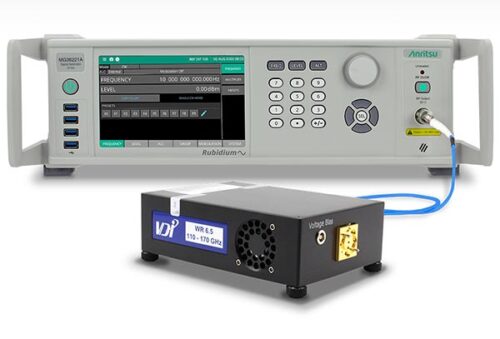 Anritsu Company introduces frequency extender modules for its Rubidium™ line of signal generators, in partnership with Virginia Diodes, Inc. (VDI). Covering 50 GHz to 1100 GHz, the modules complement Rubidium’s best-in-class performance by providing the industry’s broadest frequency coverage and best output power to create a sub-THz signal generator solution for emerging scientific, wireless communications systems, and body and material scanner applications.
Anritsu Company introduces frequency extender modules for its Rubidium™ line of signal generators, in partnership with Virginia Diodes, Inc. (VDI). Covering 50 GHz to 1100 GHz, the modules complement Rubidium’s best-in-class performance by providing the industry’s broadest frequency coverage and best output power to create a sub-THz signal generator solution for emerging scientific, wireless communications systems, and body and material scanner applications.
The integrated solution brings significant signal purity and output power benefits to sub-THz design environments. Rubidium outperforms all other signal generators in its class in phase noise and harmonic/spurious by a substantial margin. The performance advantages are preserved at sub-THz frequencies.
When the VDI frequency extender modules are used with Rubidium signal generators, engineers realize the industry’s highest output power at THz frequencies. The VDI modules offer high test port power, voltage-controlled RF attenuation, and TTL controlled ON/OFF modulation rates to a few kHz as standard.
Each frequency extender module has two multipliers, which can be configured to allow input signals in two frequency bands. One multiplier has low frequency input for < 20 GHz and 10 dBm input level and the other has high frequency input for < 50 GHz and 0 dBm input level.
The Rubidium-VDI signal generation solution meets the growing demand for emerging sub-THz radio spectrum designs. It can be used during development of satellite services, radio astronomy, earth exploration, and meteorology applications.
Wireless communication systems focusing on the W band (90 GHz to 120 GHz) and D band (130 GHz to 170 GHz), as well as intersatellite links operating at 220 GHz to 330 GHz, are also applications for which the solution is designed.
“VDI strives to produce the highest quality test and measurement solutions for the mmWave, sub-THz and THz frequency ranges through frequency extension of existing microwave test infrastructure. Achieving this requires continual innovation and development to integrate leading-edge active devices with our in-house Schottky diode technology to meet tomorrow’s measurement challenges,” said Cliff Rowland V.P. Business Development, VDI. “VDI is exited to work with Anritsu to combine our high-frequency SGX extension modules with its new signal generation capability to bring high-performance solutions to the market.”
Rubidium Delivers New Level of Performance
The Rubidium signal generator family delivers outstanding signal purity and frequency stability, even at high output power levels, across a broad frequency range of 9 kHz to 43.5 GHz. Coupled with built-in, easy-to-use, at-location frequency and power calibration capability, Rubidium offers exceptional overall utility and long-term value in a broad range of commercial, scientific, and military/aerospace measurement applications.
Rubidium offers an order of magnitude with better frequency stability compared to other signal generators that use an OCXO-based reference. The signal generators offer groundbreaking low single sideband (SSB) phase noise of -136 dBc/Hz (typical) and -140 dBc/Hz (measured) at 10 GHz and 10 kHz offset that is unmatched in the industry. Coupled with best-in-class harmonic and spurious performance, Rubidium signal generators enable customers to make highly accurate measurements.
About VDI
VDI’s mission is to make the terahertz region of the electromagnetic spectrum as useful for scientific, military and commercial applications as the microwave and infrared bands are today. VDI manufactures state-of-the-art test and measurement equipment for mm-wave and THz applications. These products include Vector Network Analyzer, Spectrum Analyzer and Signal Generator Extension Modules that extend the capability of high performance microwave measurement tools to higher frequencies. VDI’s component products include detectors, mixers, frequency multipliers and custom systems for reliable operation at frequencies between 50 GHz and 3 THz. All VDI components include in-house fabricated GaAs Schottky diodes and microelectronic filter structures.


